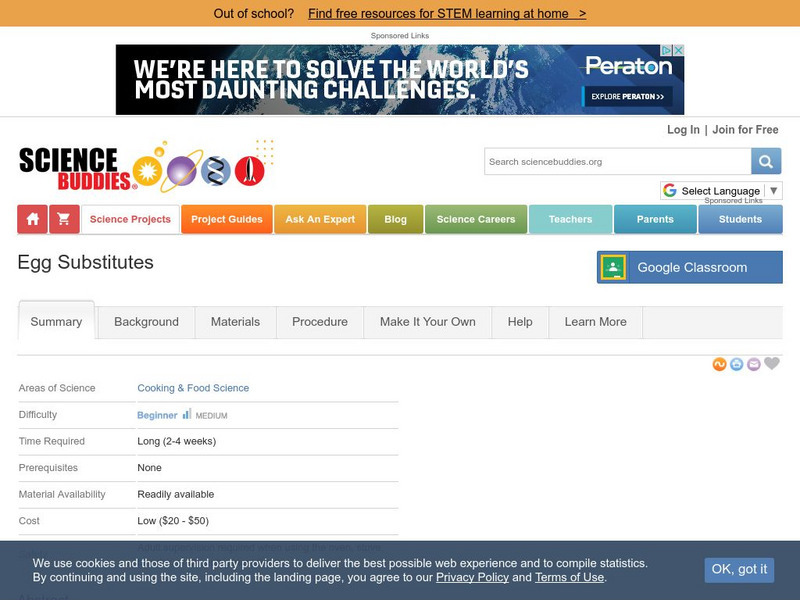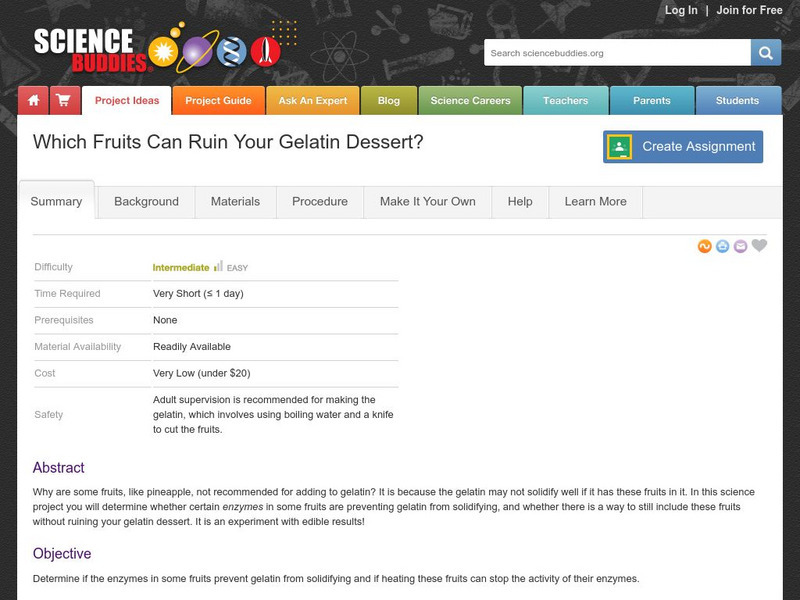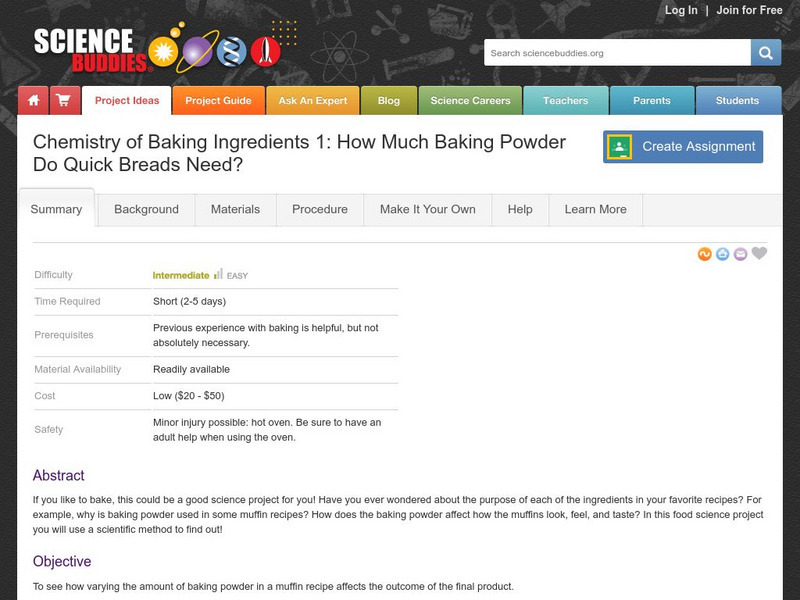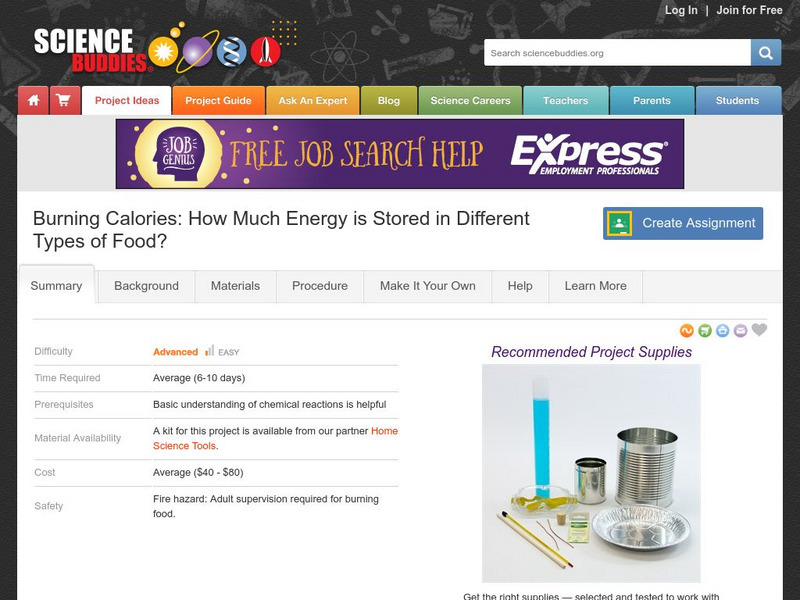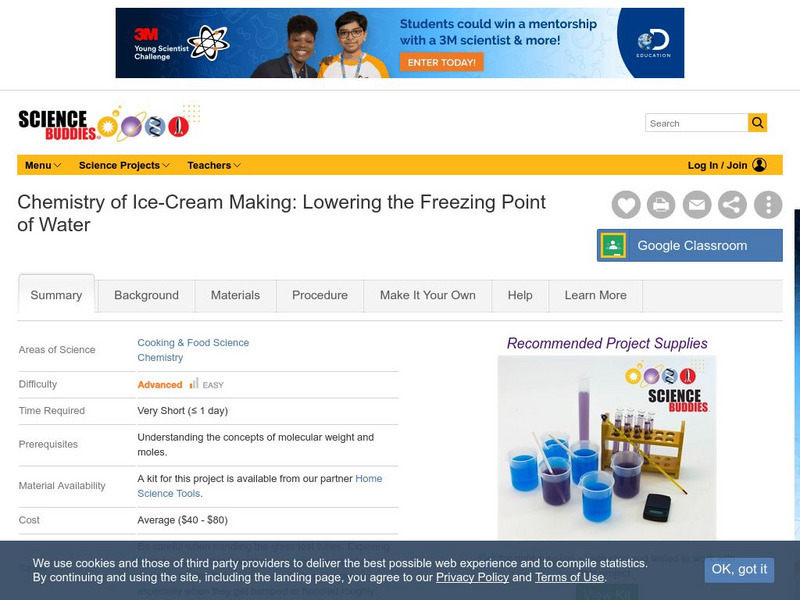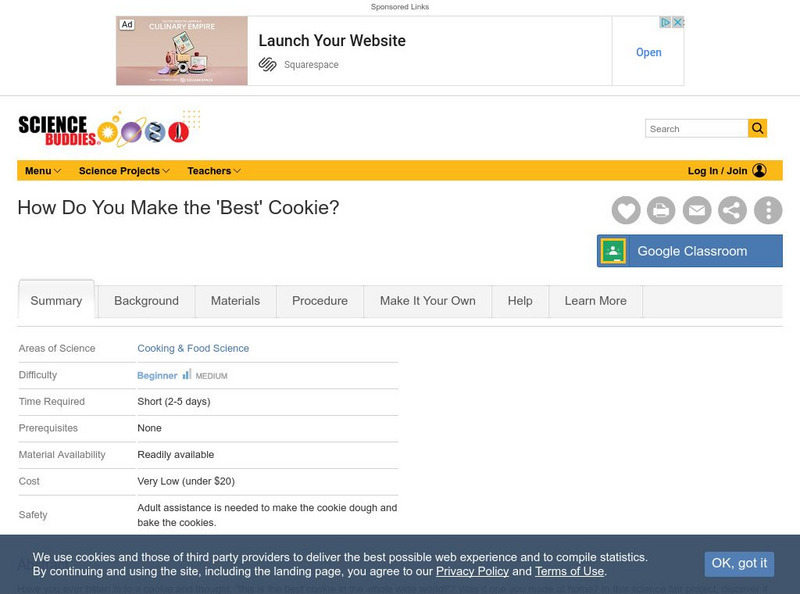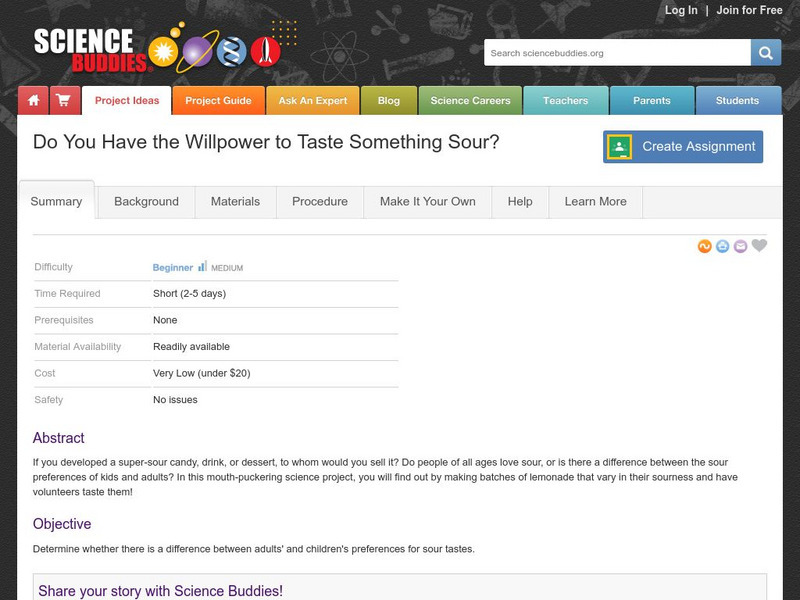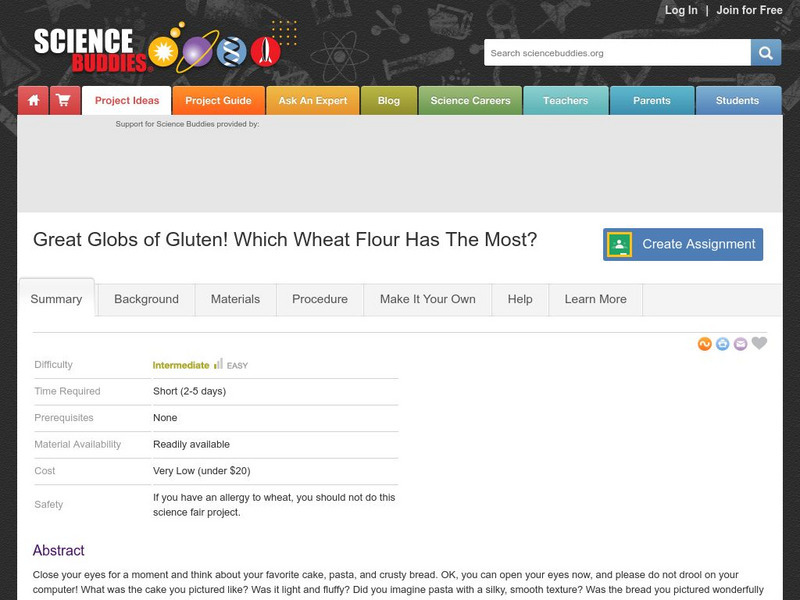Science Buddies
Science Buddies: Career Profile: Food Scientist or Technologist
The role of food scientist or food technoloigst affects us all. Read about the responsibilities of the food scientist to ensure food safety in its production and processing. This Science Buddies site lays out the requirements needed to...
Science Buddies
Science Buddies: Project Ideas: Understanding How Food Becomes Rancid
In this cooking and food science fair project, the student will determine how light and air can oxidize fat in potato chips and cause the chips to go rancid. The Science Buddies project ideas are set up consistently beginning with an...
Science Buddies
Science Buddies: Project Ideas: Hidden Grasses and Beans in Processed Foods
In this cooking and food science fair project, determine which common crops are found most often in processed foods. The Science Buddies project ideas are set up consistently beginning with an abstract, objective, and introduction,...
Science Buddies
Science Buddies: Project Ideas: Perfecting Pastries: Role of Fats
In this cooking and food science fair project the student will investigate the effect that fat and its temperature have on the taste and texture of pastry shells. The Science Buddies project ideas are set up consistently beginning with...
Science Buddies
Science Buddies: Project Ideas: How Much Sugar Is Really in That Soda?
In this science fair project, use a precision hydrometer to measure the amount of sugar in soda. The Science Buddies project ideas are set up consistently beginning with an abstract, objective, and introduction, followed by a section on...
Science Buddies
Science Buddies: Project Ideas: What Makes Foams Stand Up Straight
In this food science fair project, students will determine which foods make good edible foams, with high volume and longevity. The Science Buddies project ideas are set up consistently beginning with an abstract, objective, and...
Science Buddies
Science Buddies: Project Ideas: Simple Device to Measure the Strength of Tea
In this science fair project, measure the strength of tea, using plastic cups, a photoresistor, and a multimeter. The Science Buddies project ideas are set up consistently beginning with an abstract, objective, and introduction, followed...
Science Buddies
Science Buddies: Project Ideas: How Much Water Is Absorbed by Dried Beans?
In this cooking and food science fair project, measure how the water content of dried beans changes with time. The Science Buddies project ideas are set up consistently beginning with an abstract, objective, and introduction, followed by...
Science Buddies
Science Buddies: Project Ideas: How Much Water Is Required to Cook Pasta?
In this cooking and food science fair project, determine if you really need 6 quarts of water to cook a pound of pasta. The Science Buddies project ideas are set up consistently beginning with an abstract, objective, and introduction,...
Science Buddies
Science Buddies: Project Ideas: Sauce to Solid: Science of Cranberry Condiments
Determine how the cooking time of cranberry sauce affects its ability to form a pectin-supported solid. The Science Buddies project ideas are set up consistently beginning with an abstract, objective, and introduction, followed by a...
Science Buddies
Science Buddies: Project Ideas: Bitter to Sweet: Sugar Changes in Ripening Fruit
In this science fair project, use a refractometer to measure changes in sugar content in ripening fruit. The Science Buddies project ideas are set up consistently beginning with an abstract, objective, and introduction, followed by a...
Science Buddies
Science Buddies: Project Ideas: Save Those Spoiling Strawberries!
In this food science fair project, the student will determine if thermotherapy can inhibit strawberries from becoming moldy and decaying. The Science Buddies project ideas are set up consistently beginning with an abstract, objective,...
Science Buddies
Science Buddies: Egg Substitutes
Egg allergies are not uncommon, therefore many egg substitutes are sold in order to bake, and cook recipes that call for them. In this science project idea, you'll investigate how to modify recipes so that even egg-allergic friends and...
Science Buddies
Science Buddies: Which Fruits Can Ruin Your Dessert?
Here is a basic project for investigating enzymes that prevent gelatin from solidifying. This way you can understand why it is some fruits are not recommended for inclusion when it comes to making gelatin.
Science Buddies
Science Buddies: How Much Baking Powder Do Quick Breads Need?
If you like to bake, this could be a good project for you. There is a purpose for each of the ingredients in your recipes, but not everyone is always aware of what that purpose may be. Though this lab takes multiple days, you will...
Science Buddies
Science Buddies: Can Baking Soda Substitute for Baking Powder in a Recipe?
There's nothing quite like the smell of fresh-baked muffins for breakfast on a Saturday morning. If you're into baking, you might want to try this insightful project that lets you witness the chemistry behind making muffins. You'll get...
Science Buddies
Science Buddies: Determining Iodide Content of Salt
In this week long "kitchen chemistry" project you will use chemicals from the supermarket to test for the presence of iodine and iodide in salt. These are common micronutrients added to some preparations of table salt. A materials list,...
Science Buddies
Science Buddies: How Much Energy Is Stored in Different Types of Food?
In this project you'll learn a method for measuring how much chemical energy is available in different types of food. You will build your own calorimeter to capture the energy released by burning a small food item, like a nut or a piece...
Science Buddies
Science Buddies: Lowering the Freezing Point of Water
When it comes to making ice cream, in order to make the mixture cold enough to freeze, you surround the container with ice and rock salt. This experiment helps you learn how the addition of salt (or other substances) affects the freezing...
Science Buddies
Science Buddies: How Do You Make the 'Best' Cookie?
The benefit to cooking food from scratch versus store bought food is that you determine the taste. In this science fair project, discover if you can perfect the taste of your favorite cookie right in your own kitchen by experimenting...
Science Buddies
Science Buddies: Do You Have the Willpower to Taste Something Sour?
Do try this mouth-puckering science fair project to find out if people of all ages love sour tastes, or if there a difference between the sour preferences of kids and adults. You might be able to sell creations of your own based on your...
Science Buddies
Science Buddies: Tough Beans: Which Cooking Liquids Slow Softening the Most?
Beans are important to the diets of many people, that is why you always find it cooked a specific way or in a specific dish in different cultures. Here you will learn how the liquid that beans are cooked in affects how quickly or slowly...
Science Buddies
Science Buddies: The Science of Making Cheese!
Oooey gooey cheese - yum. Who doesn't like a slice of warm pizza straight from the oven? There's nothing quite like a slice of pizza and a glass of milk, so what makes pizza so great? The cheese. But did you know that making cheese is...
Science Buddies
Science Buddies: Great Globs of Gluten! Which Wheat Flour Has the Most?
Close your eyes for a moment and think about your favorite cake, pasta, and crusty bread. OK, you can open your eyes now, and please don't drool on your computer. What was the cake you pictured like? Was it light and fluffy? Did you...














